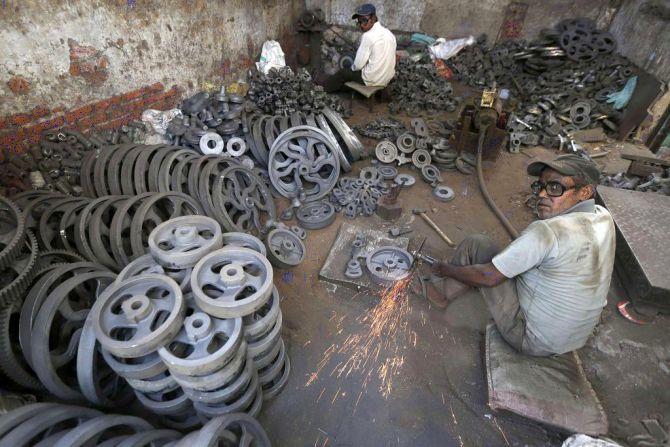Instead of mechanically consolidating all labour laws into one, provisions of all labour laws should be relooked in terms of their substance. The irrelevant and archaic provisions have to be fixed, says Aparajita Gupta.

'I propose to frame a uniform Employment Code for the state, containing all the labour laws in force in the State.
"The proposed Employment Code shall set out the framework for terms of employment and service of all the workers except domestic workers and agricultural labour and a strong, independent and separate labour judiciary.'
These words of the finance minister, J&K, from his Budget Speech 2018-19 will go down in history as starting a new chapter in labour law reforms.
The problems with the present laws have been voiced often.
To begin with, we have multiple labour laws at the national and the state level due to constitutional division of legislative powers.
Multiplicity is also due to laws regulating workers in different sectors.
We also retain some pre-Independence laws like the Fatal Accidents Act, 1855; Trade Unions Act, 1926; Payment of Wages Act, 1936; Industrial Employment (Standing Orders) Act, 1946 and so on.
Since they were made in a different era they are being amended. Many feel some provisions of even post-Independence laws are outdated.
Some point out that allowing outsiders to be part of trade unions and multiplicity of such unions create problems.
Others have raised an issue with difficulties in retrenching workers and closure.
They argue that rigid labour laws have been one reason holding back India from generating more formal jobs.
Industries instead are turning to contract labour and staying small to avoid "regulatory cholestrol" (Economic Survey 2015-16). This reduces the protection for workers.
There are also issues in applicability of these laws to service sector employees.
Currently, most of them are using laws governing shops and establishment.
Compliance has its own problems: There are multiple authorities and processes to follow. Slow dispute resolution has been identified as another bottleneck.
Efforts have been made in the past to consolidate and reform these laws.
For example, in 1968, the National Commission on Labour drafted a single code. A similar exercise was done in 1994 by the National Labour Law Association with Friedrich-Ebert-Stiftung.
In 2002, the National Commission on Labour gave a report on reforming labour laws.
Coming to the present, at the Union level, reforms are being undertaken by the labour ministry.
Some States like Rajasthan, Andhra Pradesh and Madhya Pradesh have also reformed some labour laws and processes.
The recent announcement by J&K goes a step ahead to give us a model that can then be replicated.
Since the proposed Employment Code of J&K is not yet out, it would be interesting to look at how such a code can be made.
First, it would be a great idea to draft on a clean slate.
Instead of mechanically consolidating all labour laws into one, provisions of all labour laws should be relooked in terms of their substance.
The irrelevant and archaic provisions have to be fixed.
Second, a single Employment Code will enable workers, employers, trade unions, labour authorities and other users to get all information at one place.
Third, law per se should only contain the main provisions including the ones that can’t be delegated to rule making authorities.
Everything that relate to the modalities should be in the rules. This will make changes easier.
Fourth, the prime pinister recently spoke about ‘Ease of Living’ for people.
Keeping this vision in mind, it is not too much to ask for a law that is understood by the people.
At present, lot of workers and at times employers are unable to decipher labour laws without legal help.
The US saw the plain English movement aimed to do away with unnecessary complicated language in laws. The UK followed suit.
It is time India drafts its laws simply and labour laws can be a good starting point.
Simple and clear drafting will also reduce disputes relating to interpretation.
Fifth, one needs to ensure a fine balance between interests of different stakeholders including workers, employers, trade unions and authorities.
For example, too much rigidity favouring workers or too much flexibility favouring businesses will sound the death knell for the economy.
Sixth, some reforms worth considering include a labour law covering all employees with few exceptions, laying down only minimum standards for employment and allowing flexibility, making collective bargaining efficient and reducing multiplicity of authorities and procedures.
Incorporating the suggestion of the Economic Survey 2016-17 on social security '… affording greater choice to workers which would foster competition amongst service providers' would also help.
Photograph: Amit Dave/Reuters.
Aparajita Gupta is a lawyer and Young Professional with NITI Aayog, Government of India. The views expressed are personal.











